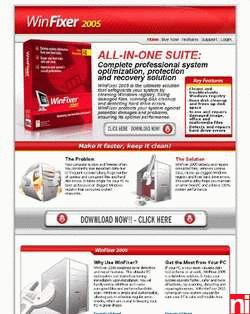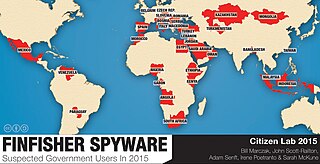Related Research Articles

Adware, often called advertising-supported software by its developers, is software that generates revenue for its developer by automatically generating online advertisements in the user interface of the software or on a screen presented to the user during the installation process. The software may generate two types of revenue: one is for the display of the advertisement and another on a "pay-per-click" basis, if the user clicks on the advertisement. Some advertisements also act as spyware, collecting and reporting data about the user, to be sold or used for targeted advertising or user profiling. The software may implement advertisements in a variety of ways, including a static box display, a banner display, full screen, a video, pop-up ad or in some other form. All forms of advertising carry health, ethical, privacy and security risks for users.

Spyware is software with malicious behaviour that aims to gather information about a person or organization and send it to another entity in a way that harms the user—for example, by violating their privacy or endangering their device's security. This behaviour may be present in malware as well as in legitimate software. Websites may engage in spyware behaviours like web tracking. Hardware devices may also be affected. Spyware is frequently associated with advertising and involves many of the same issues. Because these behaviors are so common, and can have non-harmful uses, providing a precise definition of spyware is a difficult task.
Claria Corporation was a software company based in Redwood City, California that invented “Behavioral Marketing”, a highly effective but controversial new form of online advertising. It was founded in 1998 by Denis Coleman, Stanford MBA Sasha Zorovic, and engineer Mark Pennell, based on work Zorovic had done at Stanford. In March 1999 Jeff McFadden was hired as CEO and Zorovic was effectively forced out.
Sanford 'Spamford' Wallace is an Internet spammer. He initially sent junk faxes before coming to notoriety in 1997, promoting himself as the original "Spam King". Wallace's prolific spamming has resulted in encounters with the United States government, anti-spam activists, and large corporations such as Facebook and MySpace.

Scareware is a form of malware which uses social engineering to cause shock, anxiety, or the perception of a threat in order to manipulate users into buying unwanted software. Scareware is part of a class of malicious software that includes rogue security software, ransomware and other scam software that tricks users into believing their computer is infected with a virus, then suggests that they download and pay for fake antivirus software to remove it. Usually the virus is fictional and the software is non-functional or malware itself. According to the Anti-Phishing Working Group, the number of scareware packages in circulation rose from 2,850 to 9,287 in the second half of 2008. In the first half of 2009, the APWG identified a 585% increase in scareware programs.
Cydoor is a spyware and adware first detected in 2003.
Computer fraud is a cybercrime and the act of using a computer to take or alter electronic data, or to gain unlawful use of a computer or system. In the United States, computer fraud is specifically proscribed by the Computer Fraud and Abuse Act, which criminalizes computer-related acts under federal jurisdiction.
Mobile malware is malicious software that targets mobile phones or wireless-enabled Personal digital assistants (PDA), by causing the collapse of the system and loss or leakage of confidential information. As wireless phones and PDA networks have become more and more common and have grown in complexity, it has become increasingly difficult to ensure their safety and security against electronic attacks in the form of viruses or other malware.

WinFixer was a family of scareware rogue security programs developed by Winsoftware which claimed to repair computer system problems on Microsoft Windows computers if a user purchased the full version of the software. The software was mainly installed without the user's consent. McAfee claimed that "the primary function of the free version appears to be to alarm the user into paying for registration, at least partially based on false or erroneous detections." The program prompted the user to purchase a paid copy of the program.

A scandal erupted in 2005 regarding Sony BMG's implementation of copy protection measures on about 22 million CDs. When inserted into a computer, the CDs installed one of two pieces of software that provided a form of digital rights management (DRM) by modifying the operating system to interfere with CD copying. Neither program could easily be uninstalled, and they created vulnerabilities that were exploited by unrelated malware. One of the programs would install and "phone home" with reports on the user's private listening habits, even if the user refused its end-user license agreement (EULA), while the other was not mentioned in the EULA at all. Both programs contained code from several pieces of copylefted free software in an apparent infringement of copyright, and configured the operating system to hide the software's existence, leading to both programs being classified as rootkits.

Rogue security software is a form of malicious software and internet fraud that misleads users into believing there is a virus on their computer and aims to convince them to pay for a fake malware removal tool that actually installs malware on their computer. It is a form of scareware that manipulates users through fear, and a form of ransomware. Rogue security software has been a serious security threat in desktop computing since 2008. An early example that gained infamy was SpySheriff and its clones, such as Nava Shield.
Comscore is an American-based global media measurement and analytics company providing marketing data and analytics to enterprises; media and advertising agencies; brand marketers and publishers.
The Zlob Trojan, identified by some antiviruses as Trojan.Zlob, is a Trojan horse which masquerades as a required video codec in the form of ActiveX. It was first detected in late 2005, but only started gaining attention in mid-2006.
Privacy-invasive software is software that violates the user's privacy, ranging from legitimate software to malware.

AVG Technologies is a brand of cybersecurity, privacy, performance and utility software applications for desktop computers and mobile devices developed by Avast, a part of Gen Digital. AVG was a cybersecurity software company founded in 1991 and it merged into Avast following an acquisition in 2017. It typically offers freeware, earning revenues from advertisers and from users that upgrade to paid versions for access to more features.
MS Antivirus is a scareware rogue anti-virus which purports to remove virus infections found on a computer running Microsoft Windows. It attempts to scam the user into purchasing a "full version" of the software. The company and the individuals behind Bakasoftware operated under other different 'company' names, including Innovagest2000, Innovative Marketing Ukraine, Pandora Software, LocusSoftware, etc.

FinFisher, also known as FinSpy, is surveillance software marketed by Lench IT Solutions plc, which markets the spyware through law enforcement channels.
HackingTeam was a Milan-based information technology company that sold offensive intrusion and surveillance capabilities to governments, law enforcement agencies and corporations. Its "Remote Control Systems" enable governments and corporations to monitor the communications of internet users, decipher their encrypted files and emails, record Skype and other Voice over IP communications, and remotely activate microphones and camera on target computers. The company has been criticized for providing these capabilities to governments with poor human rights records, though HackingTeam states that they have the ability to disable their software if it is used unethically. The Italian government has restricted their licence to do business with countries outside Europe.
Download Valley is a cluster of software companies in Israel, producing and delivering adware to be installed alongside downloads of other software. The primary purpose is to monetize shareware and downloads. These software items are commonly browser toolbars, adware, browser hijackers, spyware, and malware. Another group of products are download managers, possibly designed to induce or trick the user to install adware, when downloading a piece of desired software or mobile app from a certain source.
Candiru, today known as SAITO TECH is a Tel Aviv-based technology company offering surveillance and cyberespionage technology to governmental clients.
References
- ↑ "Dutch watchdog fines "DollarRevenue" €1 million for infecting 22 million computers". International Herald Tribune . Associated Press. 2007-12-20. Retrieved 2007-12-21.
- ↑ Jan Libbenga (2007-12-18). "Dutch regulator slaps spyware purveyors with €1m fine". The Register . Retrieved 2007-12-21.